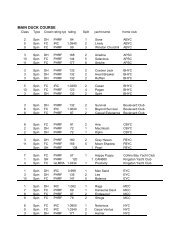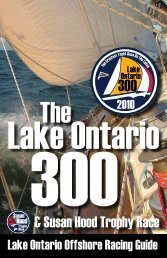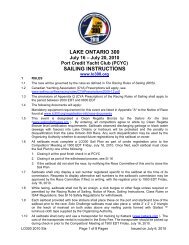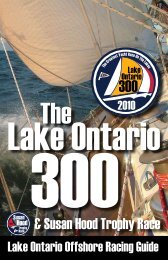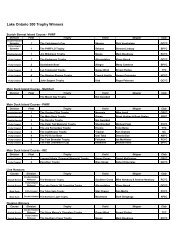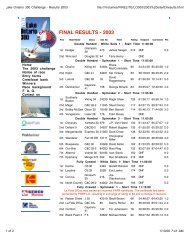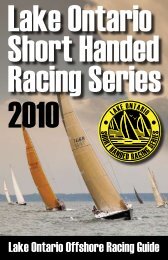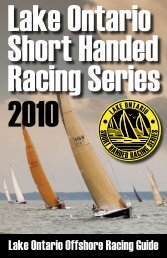Create successful ePaper yourself
Turn your PDF publications into a flip-book with our unique Google optimized e-Paper software.
Page 56 <strong>Lake</strong> <strong>Ontario</strong> <strong>Offshore</strong> Racing Guide <strong>Lake</strong> <strong>Ontario</strong> <strong>Offshore</strong> Racing Guide Page 57<br />
A GLSS Analysis of the 2010<br />
“Weather<br />
Event”<br />
by Wally McMinn<br />
2010 was a difficult race, especially challenging for the single handed sailors.<br />
The following is the analysis of the “Weather Event” that occurred about<br />
2 1/2 hours into the race as the fleet was passing to the south east of<br />
Toronto Island. It was prepared by Wally McMinn, a GLSS member and liaison<br />
between GLSS and the LO<strong>300</strong> committee.<br />
All GLSS Challenge events are inherently difficult, characterized by<br />
weather and many other uncertainties. The 2010 LO<strong>300</strong>SC was unique<br />
in terms of the severity of a weather event which moved across the fleet<br />
early in the regatta. From most reports, a series of three squalls hit the fleet as<br />
they passed Toronto and continued eastbound toward Main Duck Island along<br />
the north shore of <strong>Lake</strong> <strong>Ontario</strong>. Each was characterized by high winds, with<br />
35 knots reported from the first and third line squalls, and reports of 50-60 knot<br />
winds in the second of the cells.<br />
Eleven of the seventeen solo participants were kind enough to submit reports of<br />
their experience. These provide the basis of this summary. They were asked to<br />
comment on several specific questions, as well as offer any other observations<br />
they thought relevant. It is long standing GLSS policy to use the experiences of<br />
GLSS Challenge participants to guide gear and procedure requirement revisions<br />
for the organization, and to help others make safe long distance shorthanded<br />
passages on the Great <strong>Lake</strong>s.<br />
Background<br />
The second sailing of the LO<strong>300</strong>SC drew seventeen entrants, a significant<br />
increase over the inaugural in 2009 which had three entrants. Seven of the<br />
entrants were current GLSS members; the remaining ten were first-timers in a<br />
GLSS Solo Challenge. All of the new participants had demonstrated significant<br />
prior sailing experience, as well as completing the required 100 mile/24hr<br />
Qualifying Solo Sail. The LO<strong>300</strong>SC constitutes one of many classes within the<br />
LO<strong>300</strong>, and which included approximately 180 boats at the start. Of these, approximately<br />
60-70 retired from the event, many due to the weather event.<br />
Report Summaries<br />
Was the danger anticipated and recognized? Could it have been?<br />
A weather report and prediction was included in the pre-race Skipper’s



